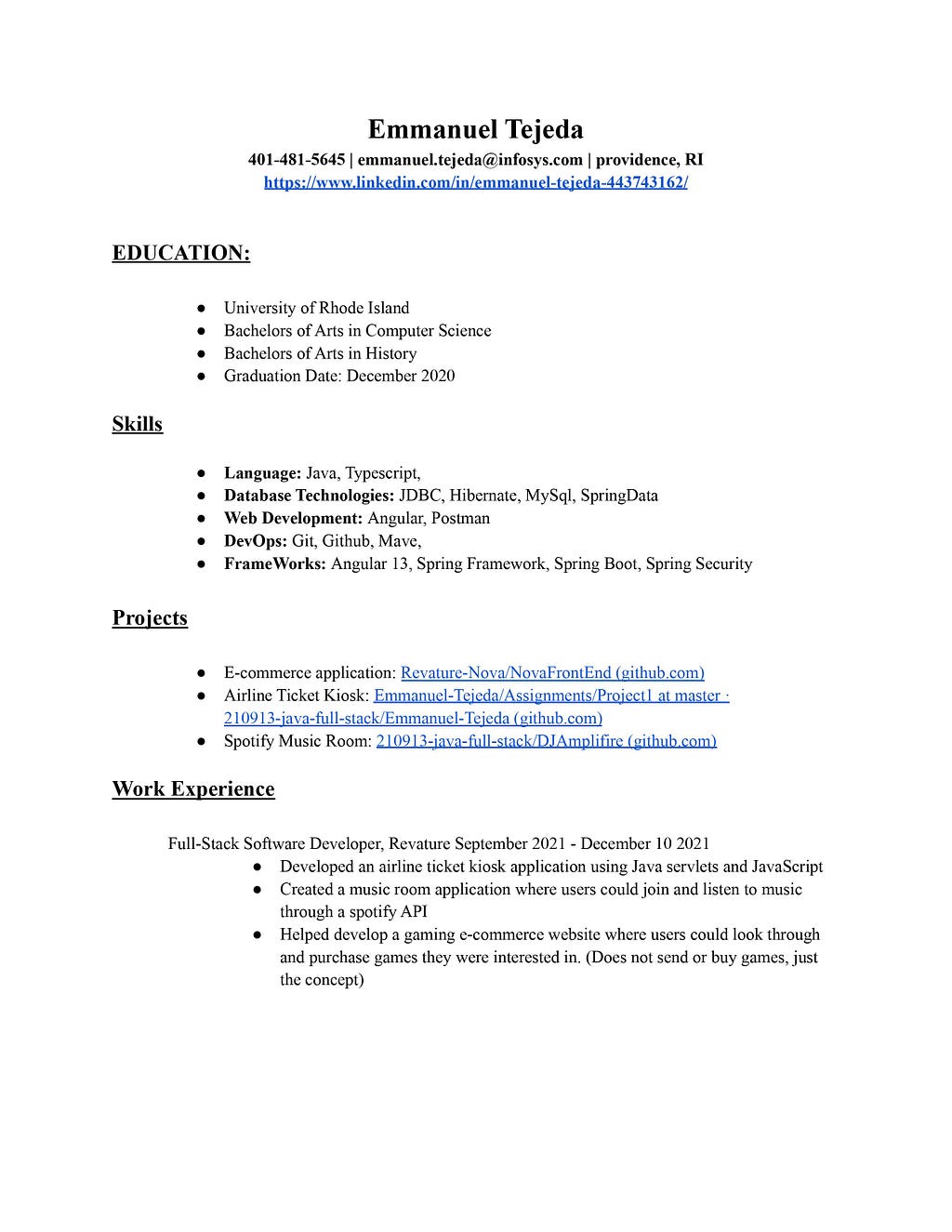This content originally appeared on Level Up Coding - Medium and was authored by Emmanuel Tejeda
What Interviewers are looking for in your resume.

When I graduated from college, one of the things my classmates were most concerned about was their resumes. They saw it as the ticket to the job or career of their dreams and that one good or bad resume could make or break their lives. In reality, while resumes are important, they are not all-encompassing. From my experience, they only make up a small part of the interviewing process. Besides, my resume was hardly mentioned in some of my interviews.
In one interview, I was asked to describe my role in a project that my colleagues and I had created. This was the biggest mention of my resume. A resume may often play a bigger role in other career fields. However, in my programming interviews, it was simply used as a checklist to determine if I had the necessary skills they were seeking and to ask me questions about the projects I had worked on. For ninety percent of the interview, I had to tell them and describe what I knew. When creating your resume, this is the mindset you should adopt: your resume is the headline, and you have to fill in the article or the meat of that headline. Your resume says it, but it is up to you to prove it in your interviews.
Where to put your effort
In light of this, I believe it is preferable to devote 90% of your time and effort to learning and studying the technologies you work with, followed by a review of your resume with the experience and confidence you gained from your studies. You will see that the resume will build itself when you are confident about what you know. Here is an example of the resume I used to work with American Express.

The fact that it is simplistic and uninteresting is precisely what makes it appealing. You have probably heard many times that interviewers only spend seconds reviewing your resume. For example, in this study by Mercy College station, “recruiters spend just 7 seconds reviewing a resume.” Therefore, it is in your best interest to provide recruiters with the information they require as soon as possible if you know what they are seeking. For example, considering my job at American Express, they sought a candidate with expertise in SpringBoot, Java, and front-end technology. All they had to do is look at the skills section and in less than 5 seconds they can see if I had what they were looking for.
Breakdown of the resume

1. Education
Almost all jobs will advertise that they only hire individuals who meet their educational criteria, whether this be a Bachelor’s, Master’s, or High School diploma. So if you meet that requirement, make sure it is the first thing they see. If they don’t, they will probably throw it in the no pile since you don’t meet the basic requirements.
2. Skills
If they see that you meet the basic requirements, you want them to know that you are knowledgeable about the technologies they require. However, they won’t want to see your projects if none of them are relevant to the position they are looking to fill.
3. Projects
Once they have determined that you meet all of the requirements, you will need to demonstrate that you can back up your claims. This is where your project sections will come into play. Your project section serves two primary purposes: it demonstrates to the employer that you have successfully utilized the technologies you advertised. It also shows that you have taken the initiative to ensure you are a skilled worker. Moreover, the more recent the project was done, the better, demonstrating that the information is still fresh.
4. Work Experience
Where you list work experience will depend on your level of experience. For example, I did not have much work experience when I created this resume. So, I made sure that my work experience was the last things they read to de-emphasize my weaknesses. However, if I had had two or three years of relevant experience, it would have been the second headline on my resume. So, when creating your resume, you should always play to your strengths, emphasizing your best qualities while downplaying your weaknesses.
5. DON’T LIE!
It should go without saying, NEVER LIE ON YOUR RESUME, but omitting is not lying. If they ask if you are familiar with a certain technology, it is acceptable to say no, but don’t promote how much you don’t know or lack. Doing that will make you look like an unconfident worker, and no employer wants that.
Hope you guys found this helpful. I know for some people creating a resume can be one of the biggest stressors when it comes to interviews, but I hope this article gave you the confidence to check this part of the interview process off your list of worries. If you have any questions leave a comment and I will get to ASAP.
Have a great day!
Resources
Eye tracking study shows recruiters look at resumes for 7 seconds
Level Up Coding
Thanks for being a part of our community! More content in the Level Up Coding publication.
Follow: Twitter, LinkedIn, Newsletter
Level Up is transforming tech recruiting ➡️ Join our talent collective
How to Make an Amazing Programming Resume was originally published in Level Up Coding on Medium, where people are continuing the conversation by highlighting and responding to this story.
This content originally appeared on Level Up Coding - Medium and was authored by Emmanuel Tejeda
Emmanuel Tejeda | Sciencx (2022-06-26T12:34:53+00:00) How to Make an Amazing Programming Resume. Retrieved from https://www.scien.cx/2022/06/26/how-to-make-an-amazing-programming-resume/
Please log in to upload a file.
There are no updates yet.
Click the Upload button above to add an update.
